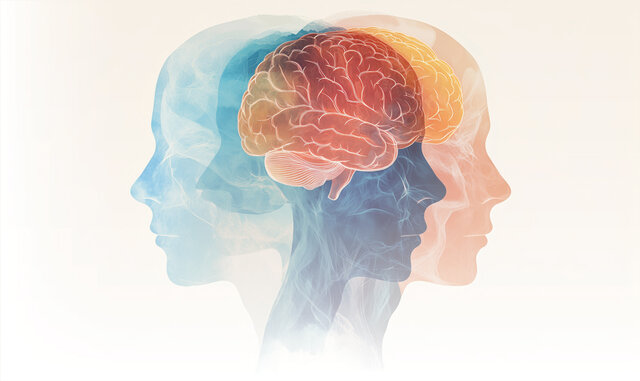Panel discussion on...
Cognitive health
Welcome in the world of alternative meat: analytical challenges and perspectives

Shaping the future of cognitive health: Personalization, technology and emerging innovations
Personalized nutrition: The role of genetic testing and microbiome insights
The emerging understanding of the gut-brain axis has driven extensive research into the potential benefits of dietary supplements on cognitive health. Evidence suggests that the gut microbiota and the brain communicate bidirectionally, with alterations in the microbiota influencing brain function (1). This bidirectional relationship implies that interventions modulating the gut microbiota, whether directly or indirectly, may exert effects on multiple organ systems. For instance, probiotics have been shown to modulate the gut microbiota, leading to beneficial effects on anxiety and stress (2).
Advancements in microbiome research have highlighted the significant inter-individual variability in the gut microbiota, influenced by external factors such as diet, hygiene, medication and physical activity (3). This variability underscores the potential of tailoring interventions based on individual genetic profiles and microbiota composition to enhance efficacy and optimize outcomes.
Additionally, the field of epigenetics has gained considerable momentum, demonstrating that diet and dietary supplements can modulate gene expression. These epigenetic modifications appear to differ between individuals, potentially explaining variations in responses to environmental and dietary factors. Understanding these complex interactions may pave the way for more personalized and impactful approaches to nutritional and cognitive health interventions.
AI and big data: Revolutionizing clinical trials for cognitive health
Artificial intelligence (AI) and big data analytics are becoming increasingly prominent in the dietary supplement field, offering innovative approaches to data generation and interpretation. The integration of digital tools such as wearables has enabled the collection of vast amounts of data with relative ease. AI technologies provide a powerful means to analyze and, to some extent, interpret this data, offering valuable insights into clinical and health-related outcomes.
In the cognitive health domain, wearables serve as effective tools for data collection. Examples include fitness trackers to monitor parameters such as sleep patterns and heart rate variability, electroencephalogram (EEG) headbands to assess brain wave activity, which may offer insights into attention, memory and cognitive function, and sleep trackers to evaluate sleep quality and duration – critical factors in cognitive health research.
While the generation of large datasets is invaluable, their utility hinges on accurate data collection, consistent data coding/terminology, and data structure, analysis and interpretation. Ensuring data integrity is a fundamental principle in good clinical practice (GCP). When conducting clinical trials, it is imperative to maintain the highest quality of source data. Early detection and resolution of data quality issues are essential to uphold the validity and reliability of study outcomes, particularly in the context of big data.
Scientific evidence of emerging cognitive health ingredients
Nootropics represent a class of dietary supplements that have been scientifically investigated for their ability to enhance cognitive functions, including memory, focus, creativity and overall brain health. This category comprises diverse bioactive compounds, including cholinergic precursors (e.g. citicoline, phosphatidylcholine), adaptogenic herbs (e.g. Withania somnifera [Ashwagandha], Rhodiola rosea, Panax quinquefolius (American ginseng)) and herbal extracts (e.g. Ginkgo biloba, Bacopa monnieri).
These substances have been studied in both healthy populations and individuals with varying degrees of cognitive impairment, with evidence suggesting their potential to support and enhance cognitive performance and brain health. For example, citicoline supplementation has been demonstrated to enhance overall memory performance, particularly episodic memory, in healthy older adults with age-associated memory impairment (4). Similarly, Ashwagandha supplementation over eight weeks significantly improved immediate and general memory, executive function and attention in individuals with mild cognitive impairment, compared to a placebo (5).
Rhodiola rosea has also garnered attention for its ability to alleviate anxiety and stress. In a study involving healthy, mildly anxious university students, four days of root extract supplementation significantly improved overall mood and reduced self-reported anxiety (6). American ginseng is another promising ingredient that has been shown to enhance cognitive function in healthy young adults, with improvements observed in working memory performance, choice reaction time accuracy and calmness, compared to a placebo (7).
Ginkgo biloba, along with its standardized extract EGb 761, stands out as one of the most extensively studied natural compounds for cognitive functioning. Its neuroprotective effects, demonstrated in both in vitro and in vivo models (8), have shown clinical benefits for cognitive performance in healthy adults, as well as those with varying degrees of cognitive impairment such as dementia. Additionally, Bacopa monnieri, a traditional Ayurvedic herb, has demonstrated potential in enhancing memory, attention and learning while reducing anxiety and mood symptoms, positioning it as a valuable ingredient for cognitive health.
These ingredients are being evaluated across diverse populations, including healthy adults, individuals with mild cognitive impairments, and older adults. However, it is essential to exercise caution when extrapolating these findings to the broader population, as individual responses and baseline cognitive health can vary significantly.
Figure 1. Overlaid Representative Chromatograms for PBM (black) and Organic Beef (pink) (6).
Panelists
References and notes
- Castells-Nobau, A., et al. (2024). "Unlocking the mind-gut connection: Impact of human microbiome on cognition." Cell Host Microbe 32(8): 1248-1263
- Ma, T., et al. (2021). "Probiotic consumption relieved human stress and anxiety symptoms possibly via modulating the neuroactive potential of the gut microbiota." Neurobiol Stress 14: 100294
- Gilbert, J. A., et al. (2018). "Current understanding of the human microbiome." Nat Med 24(4): 392-400
- Nakazaki, E., et al. (2021). "Citicoline and Memory Function in Healthy Older Adults: A Randomized, Double-Blind, Placebo-Controlled Clinical Trial." J Nutr 151(8): 2153-2160
- Choudhary, D., et al. (2017). "Efficacy and Safety of Ashwagandha (Withania somnifera (L.) Dunal) Root Extract in Improving Memory and Cognitive Functions." J Diet Suppl 14(6): 599-612
- Cropley, M., et al. (2015). "The Effects of Rhodiola rosea L. Extract on Anxiety, Stress, Cognition and Other Mood Symptoms." Phytother Res 29(12): 1934-1939
- Scholey, A., et al. (2010). "Effects of American ginseng (Panax quinquefolius) on neurocognitive function: an acute, randomised, double-blind, placebo-controlled, crossover study." Psychopharmacology (Berl) 212(3): 345-356
- Singh, S. K., et al. (2019). "Neuroprotective and Antioxidant Effect of Ginkgo biloba Extract Against AD and Other Neurological Disorders." Neurotherapeutics 16(3): 666-674
































